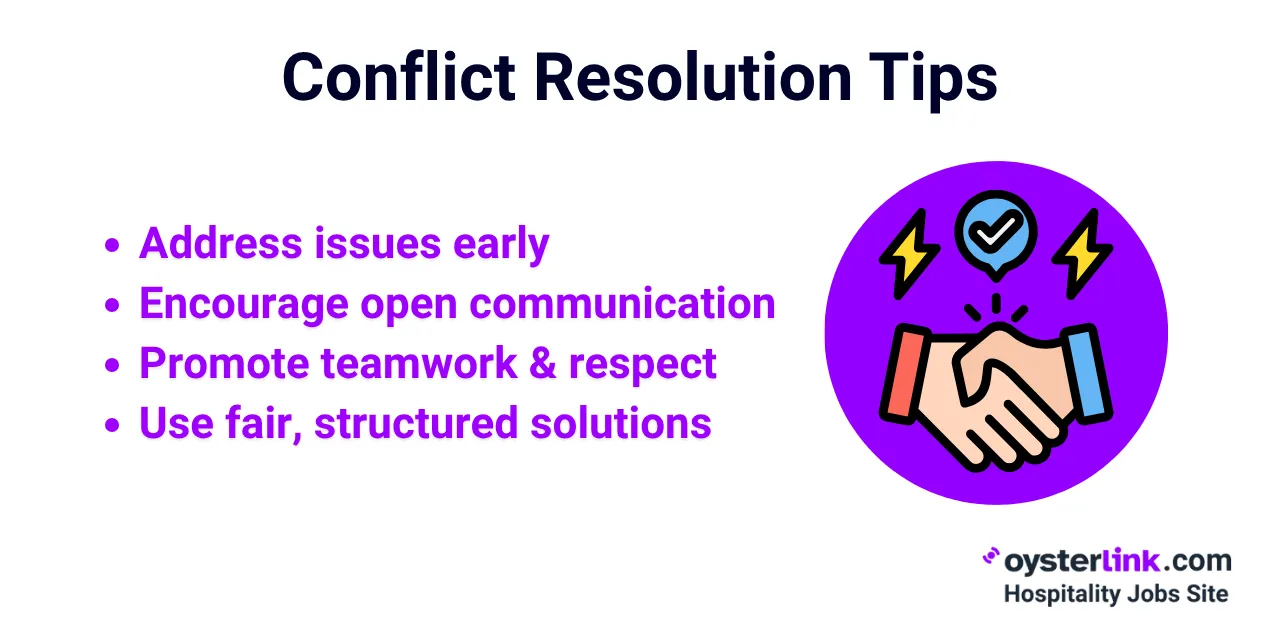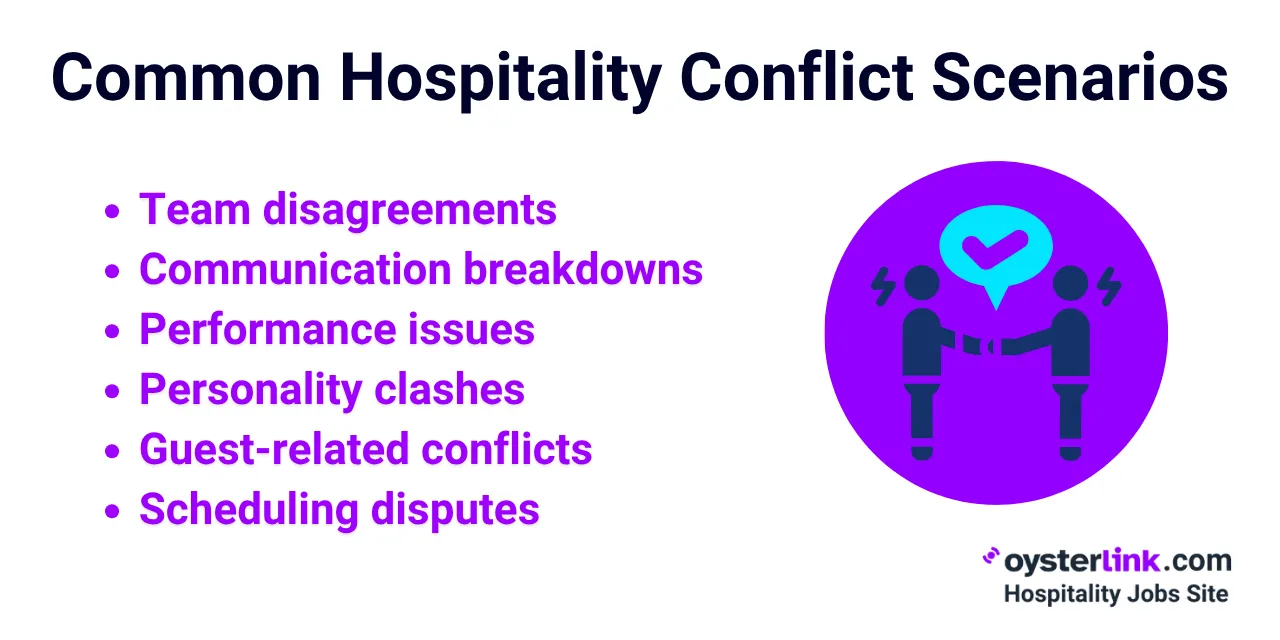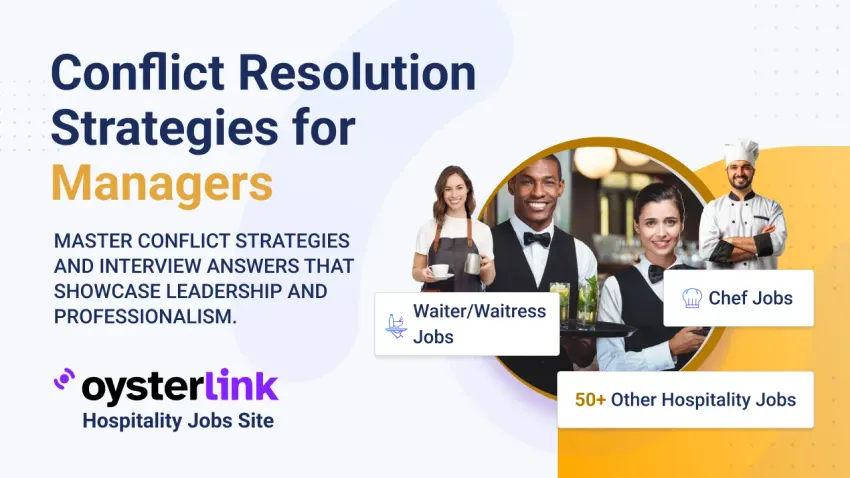Workplace conflict takes a toll on employees: 53% feel stressed, 45% take sick leave and a staggering 77% are disengaged.
If you’re applying for a leadership role — whether as a Restaurant Manager, Hotel Supervisor, Head Chef or Front Office Manager — you’ll likely be asked, “How do you handle conflict between team members?”
This article provides practical tips, a structured approach and sample responses to help you confidently answer this question.
Why Conflict Resolution Matters for Hospitality Managers
When employers ask about conflict management, they want to see more than just your ability to maintain harmony.
They may ask you to describe a time when you resolved a team conflict or to explain your general approach to handling disputes.
The goal is to understand how you assess situations and prevent issues from escalating in a high-stakes work environment.
According to CPP's report, 56% of employees say they occasionally deal with conflict at work, while 21% face it frequently and 8% say it happens all the time.
This makes it clear that navigating team dynamics is part of everyday operations — especially in hospitality.
Interviewers are looking for:
- Problem-solving skills
- Communication techniques
- Ability to lead and manage diverse personalities
- Conflict resolution strategies that keep service standards high
Your answer should show that you understand the impact of unresolved disagreements and that you actively work to keep team morale and guest experience top-notch.
Employers want to know that your leadership style aligns with their company culture and operational standards.
Proven Conflict Resolution Strategies for Hospitality Managers
Before answering this question, have a clear strategy for conflict resolution. In hospitality leadership, balancing immediate action with allowing team members to resolve minor issues independently is key.
Acting too quickly can prevent employees from learning, but waiting too long can disrupt service and guest satisfaction.
When crafting your answer, focus on these critical strategies:

- Address conflicts early to prevent them from affecting service quality, team productivity and guest experience.
- Foster open communication, setting expectations that employees should resolve minor disagreements professionally but escalate serious issues when needed
- Promote a culture of teamwork where mutual respect and problem-solving are prioritized
- Implement fair and structured approaches, such as mediation or team discussions, to find lasting solutions
Demonstrating that you take a proactive yet measured approach to conflict resolution shows interviewers that you can lead a team effectively without micromanaging.
How Hospitality Managers Can Structure Conflict Resolution Responses
Providing a clear, structured response is essential. The STAR method (Situation, Task, Action, Result) helps you break down your answer into digestible parts.
Situation and Task
Describe a real hospitality-related conflict, such as a disagreement between kitchen staff that affected service speed, a scheduling dispute among front desk employees or a conflict between servers over tip distribution. Clearly outline why the conflict was challenging and your role in resolving it.
Action
Explain the steps you took to address the issue. Did you hold a quick team huddle before service? Speak to individuals separately? Implement a new scheduling system to prevent future disputes? Show that you approached the situation with professionalism, fairness and efficiency.
Result
Highlight the outcome of your intervention. Did teamwork improve? Did service run more smoothly? Did customer satisfaction scores reflect a positive change? A strong conclusion reinforces your ability to handle workplace challenges effectively.
Using this structure shows interviewers that you approach conflicts logically and with a focus on team success and guest satisfaction.
Sample Answers to Conflict Resolution Questions for Hospitality Leaders
Having a sample answer ready can make all the difference. Here are two ways to structure your response:
General approach answer
“As a Restaurant Manager, I believe in addressing conflicts before they escalate. I encourage team members to communicate openly so that small tensions don’t turn into bigger problems.
If a disagreement arises, I first assess whether employees can resolve it themselves. If not, I step in to facilitate a conversation, ensuring that everyone’s concerns are heard and that we find a solution that maintains team cohesion and high service standards.”
STAR method answer
“In my previous role as a hotel Front Office Manager, two employees had ongoing disagreements about workload distribution, which was affecting guest check-in times. I first observed their interactions, then met with each of them separately to understand their concerns.
I brought them together for a discussion, clarified expectations and adjusted the shift assignments to balance responsibilities fairly. Within a week, the issue was resolved, teamwork improved and guest feedback on check-in experience became more positive.”
Both responses highlight leadership, adaptability and a commitment to maintaining a positive work environment.
Common Conflict Scenarios in Hospitality Workplaces
Hospitality managers regularly face fast-paced, high-pressure situations where conflicts can arise between staff, departments or even with guests. Understanding the most common scenarios helps you prepare stronger, more relevant interview answers.
Typical conflict scenarios include:
- Team disagreements about task responsibilities or workload.
- Communication breakdowns during busy service hours.
- Performance issues that affect guest experience or team efficiency.
- Personality clashes that disrupt workflow or morale.
- Guest-related conflicts that escalate and require manager intervention.
- Scheduling disputes that cause tension among team members.

Becoming a Hospitality Leader with Strong Conflict Resolution Skills
Handling conflict in hospitality leadership requires a proactive and thoughtful approach. Understanding the interviewer’s intent and preparing a structured response — whether using a general philosophy or the STAR method — shows your ability to lead effectively under pressure.
Investing time in crafting your answer not only helps in interviews but also strengthens your conflict resolution skills for real-world situations. With these strategies, you’ll be prepared to confidently tackle tough interview questions and demonstrate your value as a hospitality leader.









Loading comments...